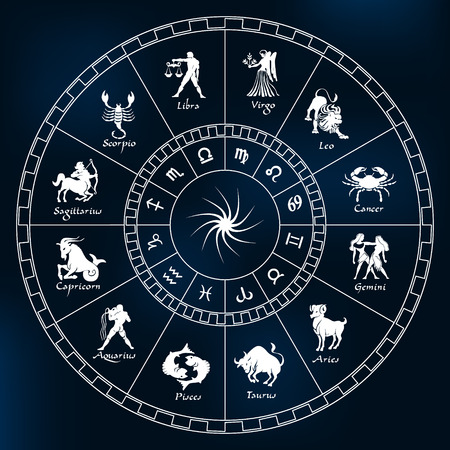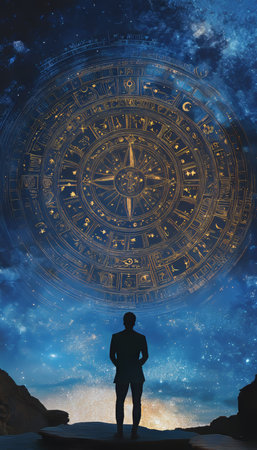Understanding Birth Charts: A British Perspective
Birth charts, also known as natal charts, have found a unique place within contemporary British society. While astrology’s roots trace back centuries and across cultures, modern-day Britain has developed its own attitudes and references towards the subject. For many, birth charts are more than just a quirky curiosity; they serve as conversation starters at dinner parties or casual pub gatherings, reflecting a blend of scepticism and intrigue that characterises much of British culture. Despite a generally pragmatic national outlook, there’s an undercurrent of fascination with the mystical, often seen in popular media and everyday banter. In the UK, discussing horoscopes or referencing one’s “star sign” is not uncommon, yet there remains significant misunderstanding about what birth charts truly represent. This opening segment explores how birth charts are perceived within Britain today, setting the stage for debunking common myths and misconceptions prevalent throughout the culture.
Myth: Birth Charts Are Only for Serious Believers or Mystics
In British culture, there is a common misconception that only those who are deeply spiritual, mystical, or wholly devoted to astrology take an interest in birth charts. This myth can make many people hesitant to explore their own charts, fearing they will be labelled as eccentric or overly superstitious. However, the reality in the UK is quite different and much more inclusive.
Birth charts have found their way into mainstream conversations, especially among younger generations and curious professionals. They’re often discussed at social gatherings, used as ice-breakers in the workplace, or even referenced light-heartedly in online dating profiles. For many Brits, exploring a birth chart is less about adopting a mystical worldview and more about self-reflection or entertainment.
The table below illustrates how various groups in the UK interact with birth charts:
| Group | Common Approach to Birth Charts |
|---|---|
| Students | Use for fun, self-discovery, and friendship bonding |
| Professionals | See it as a tool for personal insight or team-building exercises |
| Families | Discuss charts out of curiosity or family tradition |
| Sceptics | Might engage for entertainment or challenge assumptions |
This diversity shows that you don’t need to be a “serious believer” to explore your birth chart. In fact, engaging with astrology can be a light-hearted way to foster connection and conversation. Even those who approach it with scepticism can find value—whether through laughter, reflection, or simply gaining a new perspective on themselves and others.
If you’ve ever felt reluctant to look into your own chart because you don’t identify as spiritual or mystical, remember that British culture welcomes curiosity from all walks of life. You’re not alone in your interest, and there’s no need for deep commitment—just openness to discovery.

3. Myth: All Astrologers in Britain Predict the Future
It’s a common misconception that British astrologers spend their time gazing into crystal balls, making bold predictions about your future. In reality, many professional astrologers across the UK take a very different approach—one that emphasises self-reflection and personal growth rather than fortune-telling. While popular media may sometimes portray astrology as a tool for predicting lottery numbers or the exact date you’ll meet your soulmate, most British practitioners see birth charts as a map of your unique personality, strengths, and life patterns.
In fact, the modern British astrological community often encourages clients to use their birth chart as a guide for understanding themselves better. This reflective approach is rooted in helping individuals gain insight into their motivations, challenges, and emotional responses. Rather than telling you what will happen next week, an astrologer might help you explore how certain planetary influences could highlight opportunities for self-improvement or prompt you to reflect on past experiences.
This focus on self-awareness is particularly resonant within British culture, which often values subtlety and personal agency over dramatic proclamations about fate. Many people seek astrological guidance not to be told what will happen, but to find new perspectives on recurring life themes or to better navigate personal relationships and career choices. By dispelling the myth that all British astrologers are mere fortune-tellers, we can appreciate astrology as a supportive tool for reflection, growth, and conscious decision-making.
4. Misconception: Your Sun Sign Tells the Whole Story
In British culture, it’s quite common to hear people ask, “What’s your star sign?” at social gatherings or even in passing conversation. Many assume that knowing someone’s Sun sign—be it Gemini, Virgo, or Scorpio—offers a complete picture of their astrological identity. However, this is a significant misconception rooted in popular horoscopes and tabloid astrology columns that only focus on the Sun sign.
While your Sun sign does reflect your core personality traits and basic drives, it is just one piece of a much larger puzzle in your birth chart. The full astrological chart (also called a natal chart) maps the positions of all the planets, the Moon, and other celestial points at the exact time and place of your birth. This creates a uniquely detailed profile that cannot be captured by the Sun sign alone.
Why is This Misconception So Widespread?
Much of the British public’s exposure to astrology comes from daily or weekly horoscopes printed in newspapers and magazines, which traditionally use only the Sun sign for simplicity’s sake. This habit has led to the widespread belief that astrology begins and ends with these twelve basic types.
The Real Components of a Birth Chart
| Component | Description | Role in Identity |
|---|---|---|
| Sun Sign | Your central self, ego, and life force | Represents core personality |
| Moon Sign | Your emotional world and instincts | Shows how you process feelings |
| Rising Sign (Ascendant) | The mask you show to others; first impressions | Influences outward behaviour |
| Other Planets (e.g., Mercury, Venus, Mars) | Differing aspects like communication style, love language, drive, etc. | Adds depth and complexity to character |
A More Nuanced Approach to Astrology in Britain
If you’ve ever felt that your Sun sign doesn’t quite describe you—or noticed that friends with the same sign can be very different—it’s because there’s much more going on beneath the surface. Appreciating the full birth chart allows for richer self-understanding and moves beyond stereotypes often perpetuated in British media.
5. Myth: Birth Charts Contradict Science and Rational Thinking
In Britain, a country renowned for its scientific achievements and rational approach to life, astrology often faces scepticism. Many people assume that birth charts are fundamentally at odds with science and critical thinking. While it is true that astrology does not adhere to the strict methodologies of modern science, dismissing it outright can overlook the more nuanced ways in which people engage with their birth charts.
British Scepticism and Scientific Heritage
The British public often values evidence-based reasoning, shaped by a long tradition of scientific discovery. This cultural context means that astrology is frequently met with healthy doubt or even outright dismissal. In daily conversations or media discussions, it’s common to hear phrases like “I’m a Capricorn, but I don’t believe in all that nonsense,” reflecting a desire to distance oneself from anything perceived as unscientific.
Astrology Beyond Literal Interpretation
However, not everyone who explores their birth chart sees it as a literal predictor of fate. Many Britons use astrology as a tool for self-reflection rather than as a replacement for science. This approach allows individuals to enjoy the cultural and psychological aspects of astrology without feeling they must choose between science and self-exploration.
Critical Thinking and Personal Meaning
A critical mindset does not necessarily preclude personal meaning. Some psychologists suggest that engaging with symbolic systems like astrology can support introspection and personal growth, as long as one remains aware of its limitations. For many in Britain, this balanced approach honours both rationality and curiosity, allowing space for playfulness and wonder while maintaining respect for scientific principles.
Ultimately, the British relationship with birth charts is layered and complex. By recognising that interest in astrology can coexist with scientific thinking—so long as its approached thoughtfully—we foster a more open and understanding dialogue about what birth charts mean in contemporary British culture.
6. Misconception: Birth Charts Dictate Your Fate
One of the most widespread myths in British culture is the belief that birth charts are ironclad blueprints for our destinies. This misconception can lead to a sense of fatalism, where individuals feel powerless to change their path or make meaningful choices. However, it is important to foster a more nuanced understanding within the UK: birth charts are not meant to serve as unyielding scripts, but rather as sources of guidance and self-reflection.
Astrology, at its best, offers insight into your character traits, strengths, challenges, and potential opportunities. While your birth chart may highlight certain tendencies or themes, it does not predict specific events with absolute certainty. In fact, many British astrologers emphasise that personal agency and free will play a crucial role in shaping your life’s direction.
Encouraging this perspective can empower people to use their birth charts as practical tools for personal growth rather than restrictive prophecies. By viewing astrological insights as guidance—much like advice from a wise friend—you are reminded that you always have choices. Your responses, actions, and decisions matter just as much as any celestial alignment.
Ultimately, embracing this balanced viewpoint helps prevent astrology from becoming a source of anxiety or resignation. Instead, it invites a spirit of curiosity and empowerment—qualities valued in British culture—that support your journey towards greater self-understanding and fulfilment.
7. Cultural Reflections: How Birth Charts Influence Everyday British Life
While birth charts may seem like a niche interest, their influence quietly weaves through many aspects of daily life in Britain. Astrological language and ideas often surface in casual conversation—perhaps someone jokes about Mercury being in retrograde when trains are delayed, or colleagues discuss their star signs over a cup of tea. These subtle references reflect how astrology, even if met with scepticism or playfulness, forms part of the shared cultural vocabulary.
British media frequently features horoscopes and light-hearted astrological content, whether in tabloid columns, women’s magazines, or on social media platforms. This mainstream presence helps to normalise the idea that our personalities might be shaped by more than just genetics and upbringing. It also provides a springboard for self-reflection, encouraging individuals to consider their strengths and challenges from new perspectives—even if just for fun.
Among friends and family, birth charts can offer a framework for understanding differences and fostering empathy. For instance, discussions around compatibility between star signs can provide comfort or comic relief during relationship woes. In some circles, people may even use astrological insights as icebreakers at gatherings or as ways to validate feelings and decisions.
However, it’s important to recognise that while astrology is embedded in British culture, it is rarely treated with absolute seriousness. The typical British approach combines curiosity with a healthy dose of humour and critical thinking—astrology is more likely to be seen as an entertaining lens than a definitive guide.
Ultimately, birth charts serve as an accessible tool for self-awareness and connection. Whether used to prompt introspection or simply spark conversation on a rainy afternoon, they continue to influence the way Britons relate to themselves and each other—quietly shaping the emotional landscape of everyday life.


